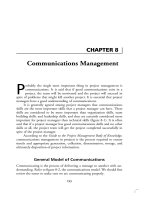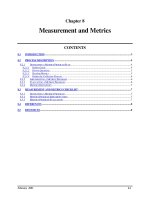Cross cultural management 3rd chapter 8 (8) culture and leadership
Bạn đang xem bản rút gọn của tài liệu. Xem và tải ngay bản đầy đủ của tài liệu tại đây (148.51 KB, 8 trang )
Slide 8.1
Chapter 8
Culture and leadership
Browaeys and Price, Understanding Cross-Cultural Management PowerPoints on the Web, 3rd edition, © Pearson Education Limited 2015
Slide 8.2
Different conceptions of leadership
A number of American and European theories about
leadership.
•Most assume:
– leadership has to do with an individual intentionally
exerting influence on others to structure the
relationships in an organisation.
•Definitions differ as to do with how the influence is
exerted and the outcome of the attempt to influence.
•The manager:
– embodiment of stability within an organisation
•The leader:
- ensures the success of the organisation.
Browaeys and Price, Understanding Cross-Cultural Management PowerPoints on the Web, 3rd edition, © Pearson Education Limited 2015
Slide 8.3
Cultural contingencies
• Cultural constraints:
– Power:
– in large power distance cultures:
– an ideal leader may well be expected to display
great authority, to the benefit of those being led.
– Uncertainty:
– in some cultures that prefer rules and avoid ambiguities
– the leader may well need to give strong direction.
– Cultural profile of the leader :
– who is making decisions as to how best to lead.
Leaders may be forced to alter their leadership
behaviour to conform to cultural realities faced.
Browaeys and Price, Understanding Cross-Cultural Management PowerPoints on the Web, 3rd edition, © Pearson Education Limited 2015
Slide 8.4
The Japanese way
Success of Japanese products in USA > increasing
attention to Japanese management
•Ouchi (1981):
– introduced the Z theory (basic Japanese approach):
•
Starting-point:
–
•
•
all employees share a collective responsibility for company’s fate
Focus on subordinates’ attitudes and responsibilities
Individuals are encouraged to develop their potential within the
company:
–
they are expected to function (with training) in different positions
This approach :
- impact on US views of management.
Browaeys and Price, Understanding Cross-Cultural Management PowerPoints on the Web, 3rd edition, © Pearson Education Limited 2015
Slide 8.5
A transformational rather than
transactional leader
• The transformational leader
– Creates, communicates and embodies a vision which can
influence changes in the attitudes and assumptions of
subordinates
– Builds their commitment inspires trust, confidence and
loyalty.
• The (traditional) transactional leader
– Has more of a ‘business-like’ relation with subordinates
– Appeals to the self-interest of all parties.
• Business needs both types of leadership:
– the most effective leaders combine the two styles
Browaeys and Price, Understanding Cross-Cultural Management PowerPoints on the Web, 3rd edition, © Pearson Education Limited 2015
Slide 8.6
Leadership: two positive
universal attributes
• Two dimensions of leadership very effective in all
societies studied:
– Team-oriented leadership:
•
the emphasis on building effective teams and implementing
a goal common to team members.
– Charismatic/value-based leadership:
•
the emphasis on the communication of vision, values and
having confidence in the ‘followers’.
Browaeys and Price, Understanding Cross-Cultural Management PowerPoints on the Web, 3rd edition, © Pearson Education Limited 2015
Slide 8.7
Leadership: two positive universal
attributes (Continued)
• Brodbeck et al. (2008) propose a number of
cultural dimensions which can predict these two
types of leadership:
– Team-oriented leadership:
Performance orientation
– Charismatic/value-based leadership:
In-group collectivism
Humane orientation
Uncertainty avoidance.
Browaeys and Price, Understanding Cross-Cultural Management PowerPoints on the Web, 3rd edition, © Pearson Education Limited 2015
Slide 8.8
Management of global talent
How to ensure (further) success of global
companies?
•Need to take account of global priorities & national contexts
•Global talent should be identified as mix of:
– Competence: necessary knowledge and skills
– Commitment: using the above in workplace while engaging
employees with their work role
– Contribution: giving value to company (promoting its
success) while gaining value from it (self-fulfilment).
• Balance needed:
•
between global standards and local needs
End
Browaeys and Price, Understanding Cross-Cultural Management PowerPoints on the Web, 3rd edition, © Pearson Education Limited 2015









